| Listing 1 - 9 of 9 |
Sort by
|
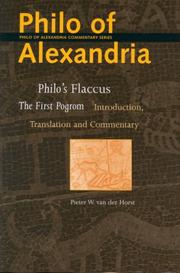
ISSN: 1570095X ISBN: 1280467541 9786610467549 1423712471 9047402308 9781423712473 9004131183 9789004131187 Year: 2003 Volume: v. 2 Publisher: Leiden Boston : Brill,
Abstract | Keywords | Export | Availability | Bookmark
 Loading...
Loading...Choose an application
- Reference Manager
- EndNote
- RefWorks (Direct export to RefWorks)
This work contains an introduction to Philo's ""In Flaccum"" in which matters of genre, historical background, and textual evidence are discussed. The main part of the work is a detailed philological and historical commentary on Philo's text.
Avillius Flaccus. --- Jews. --- Jews - Persecutions - Egypt - Alexandria. --- Jews --- Regions & Countries - Asia & the Middle East --- History & Archaeology --- Middle East --- Persecutions --- Avillius Flaccus, --- Philo, --- Alexandria (Egypt) --- History. --- Hebrews --- Israelites --- Jewish people --- Jewry --- Judaic people --- Judaists --- Flaccus, --- Ethnology --- Religious adherents --- Semites --- Judaism --- Juifs --- Persécutions --- Alexandrie (Egypte) --- Histoire --- Avillius Flaccus --- Philo of Alexandria --- Egypt --- History

ISBN: 128173134X 9786611731342 0300133146 0585347573 9780585347578 9780300133141 0300080700 9780300080704 9780300076707 0300076703 9781281731340 6611731342 Year: 1998 Publisher: New Haven Yale University Press
Abstract | Keywords | Export | Availability | Bookmark
 Loading...
Loading...Choose an application
- Reference Manager
- EndNote
- RefWorks (Direct export to RefWorks)
In this poignant book, a renowned historian tells of his youth as an assimilated, anti-religious Jew in Nazi Germany from 1933 to 1939-"the story," says Peter Gay, "of a poisoning and how I dealt with it." With his customary eloquence and analytic acumen, Gay describes his family, the life they led, and the reasons they did not emigrate sooner, and he explores his own ambivalent feelings-then and now-toward Germany and the Germans. Gay relates that the early years of the Nazi regime were relatively benign for his family: as a schoolboy at the Goethe Gymnasium he experienced no ridicule or attacks, his father's business prospered, and most of the family's non-Jewish friends remained supportive. He devised survival strategies-stamp collecting, watching soccer, and the like-that served as screens to block out the increasingly oppressive world around him. Even before the events of 1938-39, culminating in Kristallnacht, the family was convinced that they must leave the country. Gay describes the bravery and ingenuity of his father in working out this difficult emigration process, the courage of the non-Jewish friends who helped his family during their last bitter months in Germany, and the family's mounting panic as they witnessed the indifference of other countries to their plight and that of others like themselves. Gay's account-marked by candor, modesty, and insight-adds an important and curiously neglected perspective to the history of German Jewry.
Jews --- National socialism --- Hebrews --- Israelites --- Jewish people --- Jewry --- Judaic people --- Judaists --- Ethnology --- Religious adherents --- Semites --- Judaism --- History --- Persecutions --- Gay, Peter, --- Childhood and youth. --- Gay, Peter, -- 1923- -- Childhood and youth.. --- Jews -- Germany -- Berlin.. --- National socialism -- Germany -- Berlin.. --- Jews -- Germany -- History -- 1933-1945.. --- Jews -- Persecutions -- Germany -- Berlin.
Book
ISBN: 0773421629 9780773421622 Year: 2012 Publisher: Lewiston : The Edwin Mellen Press,
Abstract | Keywords | Export | Availability | Bookmark
 Loading...
Loading...Choose an application
- Reference Manager
- EndNote
- RefWorks (Direct export to RefWorks)
The book describes the role way some Catholic Bishops attempted to resist the Nazi extermination of the Jews and other populations during the Holocaust. It shows that many Catholic Bishops throughout Europe risked life and limb sheltering Jews and other victims. While other scholars forward different opinions on the matter, Lapomarda's analysis of Pope Pius XII uses factual evidence to show the Pope acted against the Nazis' treatment of the Jews, and facilitated massive movements against the final solution.
Catholic Church -- Europe -- Bishops -- History -- 20th century. --- Catholics -- Europe -- History -- 20th century. --- Catholics -- Nazi persecution. --- Jews -- Europe -- History -- 20th century. --- Jews -- Persecutions -- Europe. --- Persecution -- Europe -- History -- 20th century. --- World War, 1939-1945 -- Atrocities. --- Catholics --- Jews --- World War, 1939-1945 --- Persecution --- Nazi persecution --- Persecutions --- Atrocities --- History --- Catholic Church --- Bishops
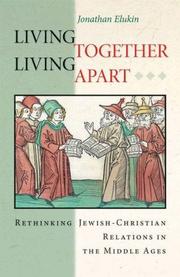
ISBN: 9780691114873 0691114870 0691162069 9786612087868 128208786X 1400827698 9781400827695 9781282087866 6612087862 Year: 2007 Publisher: Princeton, N.J. Princeton University Press
Abstract | Keywords | Export | Availability | Bookmark
 Loading...
Loading...Choose an application
- Reference Manager
- EndNote
- RefWorks (Direct export to RefWorks)
This book challenges the standard conception of the Middle Ages as a time of persecution for Jews. Jonathan Elukin traces the experience of Jews in Europe from late antiquity through the Renaissance and Reformation, revealing how the pluralism of medieval society allowed Jews to feel part of their local communities despite recurrent expressions of hatred against them. Elukin shows that Jews and Christians coexisted more or less peacefully for much of the Middle Ages, and that the violence directed at Jews was largely isolated and did not undermine their participation in the daily rhythms of European society. The extraordinary picture that emerges is one of Jews living comfortably among their Christian neighbors, working with Christians, and occasionally cultivating lasting friendships even as Christian culture often demonized Jews. As Elukin makes clear, the expulsions of Jews from England, France, Spain, and elsewhere were not the inevitable culmination of persecution, but arose from the religious and political expediencies of particular rulers. He demonstrates that the history of successful Jewish-Christian interaction in the Middle Ages in fact laid the social foundations that gave rise to the Jewish communities of modern Europe. Elukin compels us to rethink our assumptions about this fascinating period in history, offering us a new lens through which to appreciate the rich complexities of the Jewish experience in medieval Christendom.
Christianity and other religions --- Judaism --- Jews --- Social integration --- Christianisme --- Judaïsme --- Juifs --- Intégration sociale --- Judaism. --- Relations --- Christianity. --- History --- Persecutions --- Histoire --- Persécutions --- Europe --- Ethnic relations. --- Relations interethniques --- Judaïsme --- Intégration sociale --- Persécutions --- Hebrews --- Israelites --- Jewish people --- Jewry --- Judaic people --- Judaists --- Ethnology --- Religious adherents --- Semites --- Brotherhood Week --- Relations&delete& --- Christianity --- Religion --- Religions --- Christianity and other religions - Judaism. --- Judaism - Relations - Christianity. --- Jews - Europe - History - To 1500. --- Social integration - Europe. --- Jews - Persecutions - Europe. --- Europe - Ethnic relations.
Book
ISBN: 3486714937 3486703137 Year: 2012 Publisher: De Gruyter
Abstract | Keywords | Export | Availability | Bookmark
 Loading...
Loading...Choose an application
- Reference Manager
- EndNote
- RefWorks (Direct export to RefWorks)
Der Staatssekretär im Reichsministerium des Innern Wilhelm Stuckart (1902-1953) war einer der wichtigsten juristischen Interpreten und Legitimatoren des NS-Staates. Als Mit-Autor der Nürnberger Rassegesetze goss er dessen biologistische Grundlagen in Gesetze und begleitete später die Vorbereitungen zum Genozid. Im Frühjahr 1942 vertrat er auf der Endlösungskonferenz am Wannsee sein Ressort. Nach dem Krieg gehörte Stuckart zu den Schöpfern der Legende von der "sauberen Verwaltung", die sich den rassistischen Ansprüchen der NS-Machthaber widersetzt habe. Die biographische Auseinandersetzung mit Stuckart belegt nicht nur die prägende Funktion von führenden Juristen in der NS-Verwaltung, sie untersucht auch die Rolle der Innenverwaltung und ihre Mitwirkung am Genozid. Hans-Christian Jasch ist für seine Arbeit mit dem Richard-Schmid-Preis für Justizgeschichte 2012 des Forums Justizgeschichte ausgezeichnet worden.
Cabinet officers -- Germany -- Biography. --- Jews -- Persecutions -- Germany. --- Stuckart, Wilhelm, -- 1902-1953. --- Cabinet officers --- Jews --- Race defilement (Nuremberg Laws of 1935) --- Regions & Countries - Europe --- History & Archaeology --- Germany --- Persecutions --- History --- Legal status, laws, etc --- Legal status, laws, etc. --- Stuckart, Wilhelm, --- Hebrews --- Israelites --- Jewish people --- Jewry --- Judaic people --- Judaists --- Racial defilement (Nuremberg Laws of 1935) --- Racial infamy (Nuremberg Laws of 1935) --- Rassenschande (Nuremberg Laws of 1935) --- Cabinet ministers --- Ministers of State --- Secretaries of State --- Ethnology --- Religious adherents --- Semites --- Judaism --- Public officers
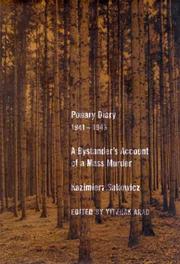
ISBN: 1281729507 9786611729509 0300129173 9780300129175 9780300108538 9781281729507 661172950X Year: 2005 Publisher: New Haven : Yale University Press,
Abstract | Keywords | Export | Availability | Bookmark
 Loading...
Loading...Choose an application
- Reference Manager
- EndNote
- RefWorks (Direct export to RefWorks)
About sixty thousand Jews from Wilno (Vilnius, Jewish Vilna) and surrounding townships in present-day Lithuania were murdered by the Nazis and their Lithuanian collaborators in huge pits on the outskirts of Ponary. Over a period of several years, Kazimierz Sakowicz, a Polish journalist who lived in the village of Ponary, was an eyewitness to the murder of these Jews as well as to the murders of thousands of non-Jews on an almost daily basis. He chronicled these events in a diary that he kept at great personal risk. Written as a simple account of what Sakowicz witnessed, the diary is devoid of personal involvement or identification with the victims. It is thus a unique document: testimony from a bystander, an "objective" observer without an emotional or a political agenda, to the extermination of the Jews of the city known as "the Jerusalem of Lithuania."Sakowicz did not survive the war, but much of his diary did. Painstakingly pieced together by Rahel Margolis from scraps of paper hidden in various locations, the diary was published in Polish in 1999. It is here published in English for the first time, extensively annotated by Yitzhak Arad to guide readers through the events at Ponary.
Jews --- Holocaust, Jewish (1939-1945) --- World War, 1939-1945 --- Persecutions --- Atrocities. --- Sakowicz, Kazimierz, --- Saḳovits', Ḳ., --- Saḳovits', A., --- Saḳovits', Ṿ., --- סאקוביץ׳, ו. --- Vilnius (Lithuania) --- Wilno (Lithuania) --- Vilʹna (Lithuania) --- Vilʹnia (Lithuania) --- Вільня (Lithuania) --- Vilnius, Lithuanian S.S.R. --- Ṿilnah (Lithuania) --- Ṿilne (Lithuania) --- Vilʹno (Lithuania) --- Vilniaus miesto savivaldybė --- Vilnius City Municipality --- Vilna (Poland) --- Ethnic relations. --- Sakowicz, Kazimierz, -- 1894-1944 -- Diaries.. --- Jews -- Persecutions -- Lithuania -- Vilnius.. --- Holocaust, Jewish (1939-1945) -- Lithuania -- Vilnius.. --- World War, 1939-1945 -- Atrocities.. --- Vilnius (Lithuania) -- Ethnic relations.
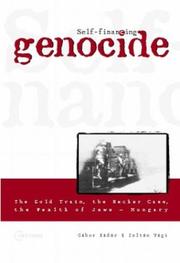
ISBN: 9639241539 9786155211034 9786611376963 1281376965 1429426276 6155211035 9781429426275 9789639241534 9781281376961 6611376968 Year: 2004 Publisher: Budapest ; New York : Central European University Press,
Abstract | Keywords | Export | Availability | Bookmark
 Loading...
Loading...Choose an application
- Reference Manager
- EndNote
- RefWorks (Direct export to RefWorks)
Discusses the process of the economic annihilation of the Jews in Hungary, who- from the economic point of view - were more influential than any other Jewish community in Europe. Following the German occupation in March 1944 the collaborating Hungarian government attempted to assert its claim concerning the complete confiscation of Jewish assets at all stages of the road leading to the extermination camps. The cooperation with the Germans proved to be the most problematic in this area. The story of the Jewish Gold Train is a relatively small but all the more emblematic chapter of the economic annihilation. The circumstances of the freight's assembling, the German-Hungarian conflicts concerning the train, the looting attempts, the fate of the assets seized by the Allies (double victimization of the survivors) provide the reader with an insight into the history of the repeated looting of the Hungarian Jewry.
Becher, Kurt, -- 1909-. --- Holocaust, Jewish (1939-1945) -- Hungary. --- Hungary -- Ethnic relations. --- Jewish property -- Hungary. --- Jews -- Persecutions -- Hungary. --- World War, 1939-1945 -- Confiscations and contributions -- Hungary. --- Regions & Countries - Asia & the Middle East --- Regions & Countries - Europe --- History & Archaeology --- Middle East --- Central Europe --- Jews --- Holocaust, Jewish (1939-1945) --- World War, 1939-1945 --- Jewish property --- Persecutions --- Confiscations and contributions --- Becher, Kurt, --- Hungary --- Ethnic relations. --- Property, Jewish --- European War, 1939-1945 --- Second World War, 1939-1945 --- World War 2, 1939-1945 --- World War II, 1939-1945 --- World War Two, 1939-1945 --- WW II (World War, 1939-1945) --- WWII (World War, 1939-1945) --- Property --- History, Modern --- 20th century, Holocaust, Hungary, Jewish studies, Jews, World War II.
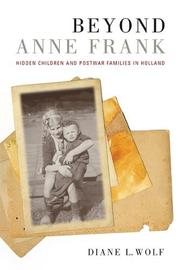
ISBN: 1282358464 1433701316 1429455764 9786612358463 0520939700 9780520939707 9781433701313 9781282358461 9781429455763 6612358467 9780520226173 0520226178 9780520248106 0520248104 Year: 2007 Publisher: Berkeley, Calif. ; London : University of California Press,
Abstract | Keywords | Export | Availability | Bookmark
 Loading...
Loading...Choose an application
- Reference Manager
- EndNote
- RefWorks (Direct export to RefWorks)
The image of the Jewish child hiding from the Nazis was shaped by Anne Frank, whose house-the most visited site in the Netherlands- has become a shrine to the Holocaust. Yet while Anne Frank's story continues to be discussed and analyzed, her experience as a hidden child in wartime Holland is anomalous-as this book brilliantly demonstrates. Drawing on interviews with seventy Jewish men and women who, as children, were placed in non-Jewish families during the Nazi occupation of Holland, Diane L. Wolf paints a compelling portrait of Holocaust survivors whose experiences were often diametrically opposed to the experiences of those who suffered in concentration camps. Although the war years were tolerable for most of these children, it was the end of the war that marked the beginning of a traumatic time, leading many of those interviewed here to remark, "My war began after the war." This first in-depth examination of hidden children vividly brings to life their experiences before, during, and after hiding and analyzes the shifting identities, memories, and family dynamics that marked their lives from childhood through advanced age. Wolf also uncovers anti-Semitism in the policies and practices of the Dutch state and the general population, which historically have been portrayed as relatively benevolent toward Jewish residents. The poignant family histories in Beyond Anne Frank demonstrate that we can understand the Holocaust more deeply by focusing on postwar lives.
Holocaust survivors --- Holocaust, Jewish (1939-1945) --- Hidden children (Holocaust) --- Jews --- Survivors, Holocaust --- Victims --- Children, Hidden (Holocaust) --- Jewish children in the Holocaust --- Persecutions --- Netherlands --- Ethnic relations. --- Jews -- Persecutions -- Netherlands.. --- Hidden children (Holocaust) -- Netherlands.. --- Holocaust, Jewish (1939-1945) -- Netherlands.. --- Holocaust survivors -- Netherlands.. --- Netherlands -- Ethnic relations. --- anne frank. --- anthropology. --- antisemitism. --- concentration camps. --- dutch society. --- family dynamics. --- family histories. --- historians. --- historical. --- history buffs. --- holland. --- holocaust historians. --- holocaust survivors. --- holocaust. --- in hiding. --- interviews. --- jewish families. --- jews in hiding. --- judaism. --- national identity. --- nazi occupation. --- nazis. --- netherlands. --- nonfiction. --- personal identities. --- postwar realities. --- traumatic history. --- wartime europe. --- world war ii. --- wwii.

ISBN: 1281377031 9786611377038 142371962X 9781423719625 9789637326301 9637326308 9781281377036 9786155053764 6155053766 Year: 2005 Publisher: Budapest New York
Abstract | Keywords | Export | Availability | Bookmark
 Loading...
Loading...Choose an application
- Reference Manager
- EndNote
- RefWorks (Direct export to RefWorks)
Set in the tumultuous moments of 1944–45 Budapest, this work discusses the operations of the Budapest Relief and Rescue Committee. Drawing out the contradictions and complexities of the mass deportations of Hungarian Jews during the final phase of World War II, Szita suggests that in the Hungarian context, a commerce in lives ensued, where prominent Zionists like Dr. Rezso Kasztner negotiated with the higher echelons of the SS, trying to garner the freedom of Hungarian Jews. Szita's portrait of the controversial Kasztner is a more sympathetic rendition of a powerful Zionist leader who was later assassinated in Israel for his dealings with Nazi leaders. Szita reveals a story of interweaving personalities and conflicts during arguably the most tragic moment in European history. The author's extensive research is a tremendous contribution to a field of study that has been much ignored by scholarship-the Hungarian holocaust and the trade in human lives.
World War, 1939-1945 --- Holocaust, Jewish (1939-1945) --- Jews --- Catastrophe, Jewish (1939-1945) --- Destruction of the Jews (1939-1945) --- Extermination, Jewish (1939-1945) --- Holocaust, Nazi --- Ḥurban (1939-1945) --- Ḥurbn (1939-1945) --- Jewish Catastrophe (1939-1945) --- Jewish Holocaust (1939-1945) --- Nazi Holocaust --- Nazi persecution of Jews --- Shoʾah (1939-1945) --- Genocide --- Kindertransports (Rescue operations) --- European War, 1939-1945 --- Second World War, 1939-1945 --- World War 2, 1939-1945 --- World War II, 1939-1945 --- World War Two, 1939-1945 --- WW II (World War, 1939-1945) --- WWII (World War, 1939-1945) --- History, Modern --- Rescue --- Persecutions --- Nazi persecution --- Atrocities --- Jewish resistance --- Ṿaʻadat ha-ʻezrah ṿeha-hatsalah be-Budapeshṭ. --- Va'adat Ezrah va-Haẓẓalah (Budapest, Hungary) --- Waʻadath ezrah we-haẓalah, Budapest --- Waʻadath ezrah we-haẓalah (Budapest, Hungary) --- Vaadat Ezra Vö-Hazalah Bö-Budapest --- Vaʻadat ha-Ezra ve-ha-Hatzala be-Budapest --- Vaʻada (Budapest, Hungary) --- Budapest Relief and Rescue Committee (Budapest, Hungary) --- Ṿaʻad ha-hatsalah (Budapest, Hungary) --- Aid and Rescue Committee (Budapest, Hungary) --- Relief and Rescue Committee (Budapest, Hungary) --- ועדת העזרה וההצלה בבודפשט --- Antisemitism --- Persecution --- Political atrocities --- Persecutions. --- Ṿaʻadat ha-ʻezrah ṿeha-hatsalah be-Budapeshṭ --- Hungary --- Austro-Hungarian Monarchy --- Dēmokratia tēs Oungarias --- Gweriniaeth Hwngari --- Hanekeria --- Hangarī --- Hongaarse Republiek --- Hongaria --- Hongarije --- Hongarye --- Hŏnggari --- Hongria --- Hongrie --- Honharije --- Hunakalia --- Hungara Respubliko --- Hungari --- Hungaria --- Hungariako Errepublika --- Hungarian Republic --- Hungariar Errepublika --- Hungario --- Hungarujo --- Hungaryah --- Hungría --- Hungrii --- Hwngari --- Jamhuri ya Hungaria --- Lepulika o Hungary --- Lýðveldið Ungverjaland --- Macaristan --- Macaristan Cumhuriyeti --- Macarıstan Respublikası --- Mađarska --- Mad̕arská republika --- Maďarsko --- Madi︠a︡rshchyna --- Madjaristan --- Madžarska --- Madźary --- Madzhar --- Madzhar Respublika --- Magyar Köztársaság (Republic) --- Magyar Népköztársaság --- Magyar Republic --- Magyar Tanácsköztársaság --- Magyarország (Republic) --- Majarstan Jȯmḣu̇rii︠a︡te --- Majoriston --- Mazharstan --- Mazharstan Respublikasy --- Ohorsʹka Respublika --- Ongiri --- Ongria --- Oonguri --- Oungaria --- Oгорська Республіка --- Pobblaght ny h-Ungaar --- Poblacht na hUngáire --- Republic of Hungary --- República da Hungria --- República de Hungría --- República d'Hongria --- Republica d'Ongria --- Republica Ungară --- Republica Ungaria --- Republica Ungrese --- Republiek van Hongarye --- Republik bu Oonguri --- Republik Hongaria --- Republik Ungarn --- Republika e Hungarisë --- Republika Mađarska --- Republika Madžarska --- Republika ng Unggarya --- Republika Ungarija --- Republika Węgierska --- Republikang Unggaro --- Republiken Ungern --- Republikken Ungarn --- République de Hongrie --- Repúvlika de Madjaristan --- Respublica Hungarica --- Tjóðveldið Ungarn --- Tlācatlahtohcāyōtl Hungria --- Uhorshchyna --- Uhorsʹka Respublika --- Ungaar --- Ungaïa --- Ungáir --- Ungar --- Ungari --- Ungari Vabariik --- Ungaria --- Ungarii︠a︡ --- Ungārija --- Ungārijas Republika --- Ungarn --- Ungarskata republika --- Ungerija --- Ungern --- Unggarya --- Unggriya --- Ungheria --- Unghirìa --- Ungri --- Ungverjaland --- Unkari --- Unkarin tasavalta --- V.N.R. --- Vengerskai︠a︡ Narodnai︠a︡ Respublika --- Vengerskai︠a︡ Respublika --- Vengrėjė --- Vengrėjės Respoblėka --- Vengrii︠a︡ --- Vengrii︠a︡ Respublikasy --- Vengrija --- Vengrijos respublika --- Vengriya --- Vengriya Respublikasi --- Venhryi︠a︡ --- VNR --- Węgry --- Xiongyali --- Xiongyali gong he guo --- Xiongyali Gongheguo --- Ουγγαρία --- Δημοκρατία της Ουγγαρίας --- Република Унгарија --- Република Мађарска --- Унгар --- Унгарската република --- Унгария --- Унгарија --- Угорська Республіка --- Угорщина --- Мажарстан --- Мажарстан Республикасы --- Мађарска --- Мадярщина --- Маджар --- Маджар Республика --- Венгрыя --- Венгрия --- Венгрия Республикасы --- Венгерская Республика --- אונגארן --- רפובליקא דא מאגיאדיסטאן --- מאגיאדיסטאן --- הונגריה --- ハンガリー --- 匈牙利 --- 匈牙利共和國 --- 헝가리 --- Ongaria --- Holocaust, Nazi (Jewish Holocaust) --- Nazi Holocaust (Jewish Holocaust) --- Nazi persecution (1939-1945) --- 20th century, Budapest, Holocaust, Hungary, Jews, Persecutions, Rescue, World War II.
| Listing 1 - 9 of 9 |
Sort by
|

 Search
Search Feedback
Feedback About
About Help
Help News
News